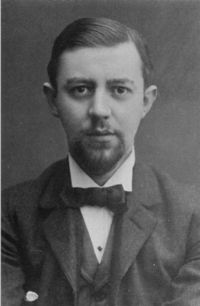Van Manen, Johan
In her book So Rich a Life, Clara Codd writes about some amusing encounters she had with Johan van Manen, during his years at Adyar. She vividly describes his sleeping habits and the odd clothes he wore. She also discovered that, in a previous life in Greece, van Manen had been her husband there, an idea van Manen did not appreciate. She tells of his strong preference about food:
Mr. van Manen had a bad temper. He was devoted to roast potatoes, and every day the native butler cooked a large plateful for him. An English couple who were then resident at Adyar considered that our food was not hygienic, so they persuaded Mrs. Besant to let them manage the kitchen. The first thing they did was to cut off Mr. van Manen’s roast potatoes. I was there when he discovered this. A tremendous roar filled the dining room: “Where are my potatoes?” A plateful had to be hastily cooked. We were glad when finally the reformers gave up and we had the native butler again.
Van Manen left the TS because of his political differences with Annie Besant during World War I. He remained in India, however, and settled in the Darjeeling district of West Bengal in order to dedicate himself to Tibetology, developing a growing interest in Tibetan lore and language. He also became interested in the literature and philosophy of China, a nation impinging on Tibet. In 1918 he started working for the Imperial Library in Calcutta, and in 1922 he was also involved with the anthropological section of the Indian museum there. From 1923 until 1939 he held the position of General Secretary of the Asiatic Society of Bengal, promoting science, and he was the editor of the Society’s yearly Journal and Proceedings. In that capacity and through his publications, he earned recognition among scholars worldwide. During his term of office, the Asiatic Society’s established stature grew even more and was officially designated the Royal Asiatic Society of Bengal. Van Manen died in Calcutta on March 17, 1943.
The Kern Institute in Leiden (Holland) published a 1989 biography by Peter Richardus, entitled The Dutch Orientalist Johan van Manen, His Life and Work.
